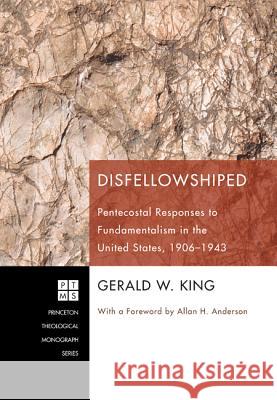Disfellowshiped: Pentecostal Responses to Fundamentalism in the United States, 1906-1943 » książka
Disfellowshiped: Pentecostal Responses to Fundamentalism in the United States, 1906-1943
ISBN-13: 9781608992553 / Angielski / Miękka / 2011 / 282 str.
Disfellowshiped: Pentecostal Responses to Fundamentalism in the United States, 1906-1943
ISBN-13: 9781608992553 / Angielski / Miękka / 2011 / 282 str.
(netto: 148,77 VAT: 5%)
Najniższa cena z 30 dni: 155,34
ok. 16-18 dni roboczych.
Darmowa dostawa!
Description: Employing studies in population ecology as a framework for understanding the growth of religious movements, Disfellowshiped traces the growth of the Pentecostal movement. The author explores how the Pentecostal movement developed in relationship to Fundamentalism from its roots in the Holiness movement to the formation of the National Association of Evangelicals. Particular attention is given to the various critiques and rebuttals exchanged between Fundamentalists and Pentecostals, exploring how these two movements influenced and shaped one another. This book shows how, despite their mutual antagonism, these two movements held far more in common than in contrast. This book will be of great importance to all those interested in the history of Fundamentalism and the rise of Pentecostalism. Endorsements: ""Pentecostalism emerged in the early years of the twentieth century, shortly followed by Fundamentalism. The adherents of the two movements shared an Evangelical heritage and yet they disagreed sharply with each other. Members of each group denounced the other as betrayers of the gospel and worse. Gerald King has analyzed their antagonistic rhetoric and its theological premises, vividly illuminating a world in which the two sides 'disfellowshiped' each other."" --David Bebbington author of Victorian Nonconformity (Cascade, 2011) ""For too long historians, following the lead of a handful of anti-pentecostal preachers from the 1920s, have treated fundamentalism and pentecostalism as totally distinct movements. As Gerald W. King's compelling book reveals, the relationship between pentecostals and fundamentalists has been far more complicated than most scholars realize. Disfellowshiped is a carefully researched book that makes a significant contribution to the religious history of the interwar era."" --Matthew Avery Sutton author of Aimee Semple McPherson and the Resurrection of Christian America (2007) About the Contributor(s): Gerald King is a recent PhD graduate of the University of Birmingham (UK).
Description:Employing studies in population ecology as a framework for understanding the growth of religious movements, Disfellowshiped traces the growth of the Pentecostal movement. The author explores how the Pentecostal movement developed in relationship to Fundamentalism from its roots in the Holiness movement to the formation of the National Association of Evangelicals. Particular attention is given to the various critiques and rebuttals exchanged between Fundamentalists and Pentecostals, exploring how these two movements influenced and shaped one another. This book shows how, despite their mutual antagonism, these two movements held far more in common than in contrast. This book will be of great importance to all those interested in the history of Fundamentalism and the rise of Pentecostalism.Endorsements:""Pentecostalism emerged in the early years of the twentieth century, shortly followed by Fundamentalism. The adherents of the two movements shared an Evangelical heritage and yet they disagreed sharply with each other. Members of each group denounced the other as betrayers of the gospel and worse. Gerald King has analyzed their antagonistic rhetoric and its theological premises, vividly illuminating a world in which the two sides disfellowshiped each other.""--David Bebbingtonauthor of Victorian Nonconformity (Cascade, 2011)""For too long historians, following the lead of a handful of anti-pentecostal preachers from the 1920s, have treated fundamentalism and pentecostalism as totally distinct movements. As Gerald W. Kings compelling book reveals, the relationship between pentecostals and fundamentalists has been far more complicated than most scholars realize. Disfellowshiped is a carefully researched book that makes a significant contribution to the religious history of the interwar era.""--Matthew Avery Suttonauthor of Aimee Semple McPherson and the Resurrection of Christian America (2007)About the Contributor(s):Gerald King is a recent PhD graduate of the University of Birmingham (UK).











